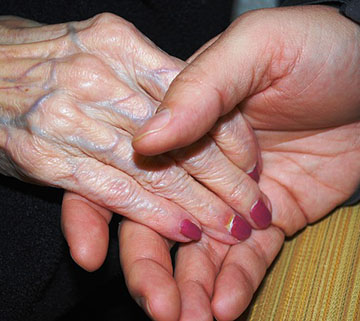Today Let’s Talk About How You Want to Die
from an illness diminish. They weigh the possible benefits of another surgery or course of chemotherapy with the risks of those interventions, including how they might affect patients’ ability to live the way they want to.
No one looks forward to those choices. They’re even harder when people don’t prepare their loved ones and doctors with frank conversations about their wishes. Less than half of Americans over 40 have “advance directives” to guide end-of-life decisions, according to a 2013 survey, and the number is smaller for younger people.
That’s why Virginia lawyer Nathan Kottkamp started a project in 2008 to designate April 16 National Healthcare Decisions Day. Arriving just after the tax filing deadline, the initiative is intended to remind Americans of that other inevitability. Kottkamp wants people to have an uncomfortable talk at the kitchen table today, to ease the discussion at a hospital bedside some time in the future.
If talking about end-of-life care is difficult for a family, it’s almost impossible for the country. The last time it was a big part of the public discourse was when Congress was debating the Affordable Care Act in 2009. A provision to have Medicare reimburse doctors for talking to patients about advance planning got twisted into accusations of “death panels.” The idea was dropped.
The Institute of Medicine took up the topic last year in a comprehensive report about end-of-life care sponsored by an anonymous donor. The expert panel found that doctors and patients have trouble discussing end-of-life care too:
The overall quality of communication between clinicians and patients with advanced illness is poor, particularly with respect to discussing prognosis, dealing with emotional and spiritual concerns, and finding the right balance between hoping for the best and preparing for the worst. Ample evidence documents structural and financial disincentives for having these discussions. In the absence of adequate documented advance care planning, the default decision is to treat a disease or condition, no matter how hopeless or painful.
The report noted that most people “choose maximizing independence and quality of life over living longer,” so effective advance planning may reduce health-care costs “associated with unnecessary and unwanted interventions.” (Some research suggests that when doctors are considering treatment options for themselves, they prefer less care.)
Kottkamp says advance planning isn’t about cost-cutting. It’s about autonomy. If a patient wants to exhaust every possible treatment to keep her or him alive, the patient can put that in an advance directive. The problems arise when there are no instructions. “In a sense, death panels in their truest form exist today. What they are is families who have to get together and make a choice about a mom or dad who’s dying,” Kottkamp says.
Originally published by Bloomberg, author John Tozzi.


Leave a Comment
You must be logged in to post a comment.